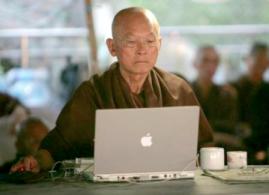 (this one is for Hayden, a London based friend who’s a leading expert on online strategy)
(this one is for Hayden, a London based friend who’s a leading expert on online strategy)
“Bloggers are the monks of the 21st century”, I told Hayden. Granted, we were on our third pint of beer by then, but there was actually a point to it.
Bloggers, like monks did centuries ago, toil away in their rooms, producing written information they can’t be sure anyone will ever read. And just like monks, they don’t usually make any money doing so.
Of course, to blog these days you don’t need a vow of silence, practice abstinence or shave your head and wear a robe. Nor do you even need to be able to produce a reasonably formed sentence. On the other hand, if you do actually know what you’re talking about, there’s a whole world out there waiting for your opinion.
These days, enter a search term into Google, and blogs will often show up higher on the list than traditional news stories. They have the inside information, don’t have any advertisers to please, and they can even stay anonymous. That’s what we call Web 2.0: power to the people.
Why do bloggers even care? Why would they share information that can in fact only help other people? Strategically, it’s a bad idea to explain how stuff works to other people – you can make a lot more money/power if you’re the only one in the know, right?
But they do, and they do it well, often (let’s forget about the 98% of people blogging about their cat or “well, this is my second blog” or the future of their company no-one cares about). PerezHilton.com is now accepted as the best source of information about Hollywood stars, Engadget does the same for all the new shiny blinky toys, and if you want any real information on for instance the credit crisis or oil prices or even Euro 2008, turn to the bloggers.
It may not have been the monks that started blogging, but they did start our tradition of education. Ever noticed how the layout of our classrooms (usually rows of seats facing one single chancel) resembles a church? And indeed, the best bloggers are all about telling us stuff we didn’t know yet, or at the very least explaining the bits that were unclear.
Unselfishly educating others is one of the things that makes us human. It can at times be extremely annoying, yes, but occasionally, it may even help the species. Sharing information may be a bad strategy for the individual, but it’s very good on a global scale.
Web 2.0 is so much about sharing and communities that it’s almost a throwback to the hippie age. Make blog, not war, that kind of thing. Of course, it’s also about turning this into a profit (it is the 21st century, after all). If people care enough about the products you sell, you can let them write reviews – and the better the reviews, the more you sell.
So think about that, when you’re attending a webinar at the other side of the ocean, or producing a podcast, or reviewing the new LCD TV you just bought: essentially, you’re continuing the work of that monk in 1108 copying poetry or writing down historical events. He would have been proud of you!
(Well, maybe not. But at least he would have shut up about it.)
